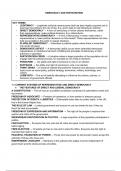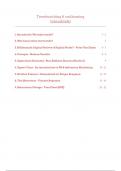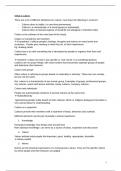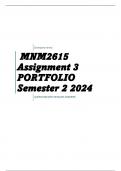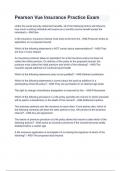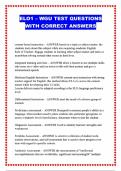DEMOCRACY AND PARTICIPATION
KEY TERMS
- LEGITIMACY → Legitimate authority means power that has been legally acquired and is
exercised according to the rule of law. E.g. govt’s right to rule following an election
- DIRECT DEMOCRACY → A form of democracy in which citizens themselves, rather
than representatives, make political decisions. E.g. referendums
- REPRESENTATIVE DEMOCRACY → A form of democracy in which voters elect a
representative to make political decisions on their behalf. These representatives are then
held accountable to the public in regular elections,
- PLURALIST DEMOCRACY → Describes a political system where there is more than
one centre of power.
- DEMOCRATIC DEFICIT → A democratic deficit occurs when ostensibly-democratic
organisations or institutions fall short of fulfilling the principles of democracy in their
practices or operation.
- PARTICIPATION CRISIS → A situation where a large proportion of the population do not
engage with the political process, for example by not voting in elections.
- FRANCHISE → the ability and right of someone to vote in an election.
- SUFFRAGE → the ability and right of someone to vote in an election
- THINK TANKS → A research institute that performs research and advocacy concerning
topics such as social policy, political strategy, economics, military, technology, and
culture.
- LOBBYISTS → The act of lawfully attempting to influence the actions, policies, or
decisions of government officials,
1.1 CURRENT SYSTEMS OF REPRESENTATIVE AND DIRECT DEMOCRACY
● THE FEATURES OF DIRECT AND LIBERAL DEMOCRACY
A CONSTITUTION → The UK has an uncodified constitution comprised of authoritative works and
documents
FREEDOM OF ASSOCIATE → Freedom of expression, to form parties or pressure groups.
PROTECTION OF RIGHTS + LIBERTIES → Enforceable basic laws to protect rights. In the UK,
this is the Human Rights Acts.
THE RULE OF LAW → Limited government and ensure no one can break the law, if they do,
they’ll be held accountable.
FREEDOM OF EXPRESSION AND INFORMATION → The right of the people to express their
opinion and critics of the government.
WIDESPREAD PARTICIPATION IN POLITICS → Large proportion of the population participates in
politics.
FAIR ELECTION → Everyone has one vote and all votes are equal. Avoid electoral fraud and
ballot rigging.
FREE ELECTION → All adults are free to vote and to stand for office. Everyone has the right to
exercise their right to vote.
PEACEFUL TRANSITION OF POWER → Those who lose power by democratic means accept the
authority of those who have won.
INDEPENDENT JUDICIARY → Members of the judiciary (the judge) must be independent of
government and the whole process of politics.
, ● THE FEATURES OF REPRESENTATIVE DEMOCRACY
SOCIAL REPRESENTATION → Elected officials such as MPs are expected to represent the
interests, values and concerns of the broader society they represent. (descriptive)
CONSTITUENCY REPRESENTATION → The people choose individuals to represent them in
government, Each area elects one person to represent them.
PARTY REPRESENTATION → Political parties you vote for will speak and act on your behalf in
government
CASUAL REPRESENTATION → Politicians should work to connect the dots between what their
constituents want and the policies they push for in government.
PRESSURE GROUPS → Organisations that aim to influence government decisions on specific
issues, shaping government actions and policies by representing the interests of their members or
cause.
● THE SIMILARITIES AND DIFFERENCES BETWEEN DIRECT DEMOCRACY AND
REPRESENTATIVE DEMOCRACY
SIMILARITIES DIFFERENCES
1.People are sought after to have their 1.People make decisions (e.g. through a
opinions expressed. referendum) instead of through elected or
2.Legislature that represents their views. appointed bodies.
3.Initiatives, petitions, public consultations etc 2.Government held accountable.
happen all the time within representative 3.Direct democracy is majoritarian - working on
democracies in order for the gov. to represent the will of the majority - risk of tyranny of the
the people e.g. following 'let's talk Newcastle' majority e.g. California 2008 initiative to ban
the council decided the budget not the people civil partnerships - discriminatory.
they simply kept in mind what was said during Representative democracy mediates between
the consultations. different groups representing them all thus
4.Pressure groups etc who use direct avoiding this.
democracy to put forward their views are an 4.Parliament is sovereign whereas in direct it is
integral part of representative democracy - e.g. subservient to the people if it likes it or not - it's
many of the Conservative's economic policies power is greatly weakened by direct
are guided by the BBA but they work very democracy e.g. Bill of Rights taken out of
much as a representative democracy. Queen's Speech - delayed possibly for up to a
year - due to opposition in part from Liberty
campaign and petitions e.g. Change.org's
petition against the Bill 230,000 people signed.
5.More likely to result in rational decision -
direct often works with emotions e.g. AV
referendum negative vote after Lib Dems went
back on their promise on tuition fees
.6.Handles complex and technical political
decisions - this isn't practical for direct
democracy e.g. AV low turnout and negative
vote partly due to complexity; Scottish
Referendum lead up lasted months because
people needed to be educated on the political,
economic, and social implications.
KEY TERMS
- LEGITIMACY → Legitimate authority means power that has been legally acquired and is
exercised according to the rule of law. E.g. govt’s right to rule following an election
- DIRECT DEMOCRACY → A form of democracy in which citizens themselves, rather
than representatives, make political decisions. E.g. referendums
- REPRESENTATIVE DEMOCRACY → A form of democracy in which voters elect a
representative to make political decisions on their behalf. These representatives are then
held accountable to the public in regular elections,
- PLURALIST DEMOCRACY → Describes a political system where there is more than
one centre of power.
- DEMOCRATIC DEFICIT → A democratic deficit occurs when ostensibly-democratic
organisations or institutions fall short of fulfilling the principles of democracy in their
practices or operation.
- PARTICIPATION CRISIS → A situation where a large proportion of the population do not
engage with the political process, for example by not voting in elections.
- FRANCHISE → the ability and right of someone to vote in an election.
- SUFFRAGE → the ability and right of someone to vote in an election
- THINK TANKS → A research institute that performs research and advocacy concerning
topics such as social policy, political strategy, economics, military, technology, and
culture.
- LOBBYISTS → The act of lawfully attempting to influence the actions, policies, or
decisions of government officials,
1.1 CURRENT SYSTEMS OF REPRESENTATIVE AND DIRECT DEMOCRACY
● THE FEATURES OF DIRECT AND LIBERAL DEMOCRACY
A CONSTITUTION → The UK has an uncodified constitution comprised of authoritative works and
documents
FREEDOM OF ASSOCIATE → Freedom of expression, to form parties or pressure groups.
PROTECTION OF RIGHTS + LIBERTIES → Enforceable basic laws to protect rights. In the UK,
this is the Human Rights Acts.
THE RULE OF LAW → Limited government and ensure no one can break the law, if they do,
they’ll be held accountable.
FREEDOM OF EXPRESSION AND INFORMATION → The right of the people to express their
opinion and critics of the government.
WIDESPREAD PARTICIPATION IN POLITICS → Large proportion of the population participates in
politics.
FAIR ELECTION → Everyone has one vote and all votes are equal. Avoid electoral fraud and
ballot rigging.
FREE ELECTION → All adults are free to vote and to stand for office. Everyone has the right to
exercise their right to vote.
PEACEFUL TRANSITION OF POWER → Those who lose power by democratic means accept the
authority of those who have won.
INDEPENDENT JUDICIARY → Members of the judiciary (the judge) must be independent of
government and the whole process of politics.
, ● THE FEATURES OF REPRESENTATIVE DEMOCRACY
SOCIAL REPRESENTATION → Elected officials such as MPs are expected to represent the
interests, values and concerns of the broader society they represent. (descriptive)
CONSTITUENCY REPRESENTATION → The people choose individuals to represent them in
government, Each area elects one person to represent them.
PARTY REPRESENTATION → Political parties you vote for will speak and act on your behalf in
government
CASUAL REPRESENTATION → Politicians should work to connect the dots between what their
constituents want and the policies they push for in government.
PRESSURE GROUPS → Organisations that aim to influence government decisions on specific
issues, shaping government actions and policies by representing the interests of their members or
cause.
● THE SIMILARITIES AND DIFFERENCES BETWEEN DIRECT DEMOCRACY AND
REPRESENTATIVE DEMOCRACY
SIMILARITIES DIFFERENCES
1.People are sought after to have their 1.People make decisions (e.g. through a
opinions expressed. referendum) instead of through elected or
2.Legislature that represents their views. appointed bodies.
3.Initiatives, petitions, public consultations etc 2.Government held accountable.
happen all the time within representative 3.Direct democracy is majoritarian - working on
democracies in order for the gov. to represent the will of the majority - risk of tyranny of the
the people e.g. following 'let's talk Newcastle' majority e.g. California 2008 initiative to ban
the council decided the budget not the people civil partnerships - discriminatory.
they simply kept in mind what was said during Representative democracy mediates between
the consultations. different groups representing them all thus
4.Pressure groups etc who use direct avoiding this.
democracy to put forward their views are an 4.Parliament is sovereign whereas in direct it is
integral part of representative democracy - e.g. subservient to the people if it likes it or not - it's
many of the Conservative's economic policies power is greatly weakened by direct
are guided by the BBA but they work very democracy e.g. Bill of Rights taken out of
much as a representative democracy. Queen's Speech - delayed possibly for up to a
year - due to opposition in part from Liberty
campaign and petitions e.g. Change.org's
petition against the Bill 230,000 people signed.
5.More likely to result in rational decision -
direct often works with emotions e.g. AV
referendum negative vote after Lib Dems went
back on their promise on tuition fees
.6.Handles complex and technical political
decisions - this isn't practical for direct
democracy e.g. AV low turnout and negative
vote partly due to complexity; Scottish
Referendum lead up lasted months because
people needed to be educated on the political,
economic, and social implications.

